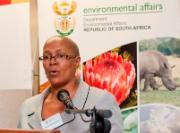
“The ELRC awakens our excitement about the environment and our potential as environmental activists putting us in touch with the world, the soil and the ecology of the earth,” said Dr Tanya Abrahamse, the CEO of South African National Biodiversity Institute (SANBI).
“As custodians of this earth, we must be aware of the skills and experience of our ancestors, who lived on this land for many centuries and treated it well,” she added.
Dr Abrahamse was one of four special guests invited to speak at the opening of the Environmental Learning and Research Centre (ELRC) at Rhodes on Thursday last week.
The Director-General of the Department of Environmental Affairs, Ms Nosipho Ngcaba, emphasised the ELRC’s value in educating the Makana community on the sustainable use of natural resources.
She said when she visited Grahamstown on her way to a meeting in Alicedale in 2006, she recalls how the Botanical Gardens was in a state of severe neglect; a marked difference from when she returned a few years later.
“There is the notion that higher learning institutions are not good at navigating the prevailing environmental conditions - but the existence of the ELRC is guaranteed as it practices leadership that acknowledges its role within society,” she added.
Ms Ngcaba said the initial budget of R7 million was increased to R19 million and she hopes the ELRC can further contribute towards the biodiversity sector as “policies and programmes may not be sufficient- we need to help promote more research in conjunction to environmental education programmes”.
Around 15 PhD alumni were present at the opening and the other officials were Makana councillor Ms Julie Wells and Acting Vice-Chancellor, Dr Sizwe Mabizela. In his welcoming address, Dr Mabizela said it was “a special and historic evening, for Makana Municipality and the Grahamstown/iRhini community”.
He said as one of 12 similar centres in South Africa recognised by UNESCO, the ELRC is located at the intersection between the university and Botanical Gardens. It has enjoyed 22 years of local, international and national research.
Dr Mabizela regards Murray Roberts Chair, Prof Lotz-Sisitka as “a great champion of Environmental Education”. “Environmental issues cannot be separated from social justice- as environmental rights are human rights,” said Dr Mabizela.
“There can be no human rights without a planet on which to enjoy these rights.” He has noted an increase in environmental issues in the national curriculum, with up to 50% increase in environmental content in some learning areas.
“Now the challenge is to support our teachers as new and more complex environmental issues arise,” added Dr Mabizela.
“This is already a centre of excellence,” said Makana Councillor, Dr Julie Wells, who has been involved with the planning of the centre since the early stages. Mapping the history of the ELRC and Botanical Gardens since 2000, she said the idea for the centre grew from the gardens being used as a teaching and learning tool.
The municipality’s Local Environmental Action Plan (Leap) was established at the same time, becoming “the blueprint for good environmental practice”. The partnership between the ELRC and Makana Municipality is being extended to include Cacadu District Municipality with the next step being move onto phase three of the project, which is re-developing Ornee Cottage, the building located in the gardens, into a visitor’s centre.
The ELRC was constructed through a partnership between the Department of Environmental Affairs and Tourism (DEAT), Makana Municipality and Rhodes and boasts a number of inviting facilities. One of the key projects of the centre is the sustainability commons; a public knowledge project that focuses on practice-centred approaches, bridging the gap between theory and action.
Funded by the Expanded Public Works programme through the South African Biodiversity Institute and DEAT, the ELRC forms part of the Makana Botanical Gardens renovations project. Spearheaded by Prof Rob O’Donoghue (who offered environmental training to the 100 previously unemployed builders during the construction phase) and Prof Heila Lotz-Sisitka, the ELRC is a unique facility that serves not only students of environmental education, but the community at large.
Ms Ngcaba officially opened the centre on 13 September.
By Anna-Karien Otto
Photo by: Desiree Schirlinger
